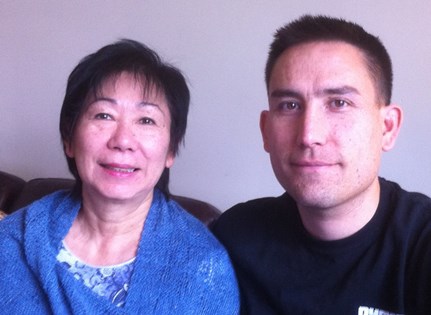
Mark Hartley (right) received a kidney transplant from his mother, Ruth (left).
Even though he was diagnosed with an incurable kidney disease in his early 30s, Mark Hartley considers himself lucky. As a triathlete, he was in good shape, and he was diagnosed before his disease started to take over his life. He also had three people volunteer to give him a kidney, and all three were a match.
“In the end, my mom insisted she wanted to provide the kidney, because I might need another one many years from now, and she might not be around then,” said Hartley, who is now 35.
The surgery went well and Hartley took part in a research study.
“I wanted to participate in the study because I knew I would get closer monitoring, and I also liked the idea of helping to improve care for future transplant patients,” said Hartley.
That study – led by Dr. Greg Knoll, kidney transplant specialist at The Ottawa Hospital and the University of Ottawa, and coordinated by Valerie Cronin, Clinical Research Nurse Coordinator – is now complete and it is indeed improving care for patients around the world.
The study tested a drug called levofloxacin, which had been used to prevent serious infections in kidney transplant patients. Although previous small studies suggested that this drug was effective, Dr. Knoll’s large, carefully designed study showed that this was not the case, and in fact, the drug caused serious side effects in some patients. The results were published in the prestigious Journal of the American Medical Association (JAMA).
“While the failure of this drug is disappointing, this rigorous evidence should ensure that kidney transplant patients are no longer exposed to this unnecessary and potentially harmful drug,” said Dr. Knoll. “This also opens the door to research on new and better treatments.”
This is just one example of kidney transplant research at The Ottawa Hospital that has improved care for patients in Ottawa and around the world. Other projects are focusing, for example, on treatments that would delay the progression of kidney disease and ways of encouraging more organ donation.
All this gives Hartley hope that if he does need another transplant someday, his recovery may be even better, or maybe he won’t even need the transplant in the first place. In the meantime, he is looking forward to training for an Olympic distance triathlon next summer.

Support patient care and research at
The Ottawa Hospital


 To reset, hold the Ctrl key, then press 0.
To reset, hold the Ctrl key, then press 0.